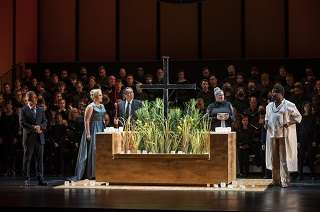|
Back
Reason versus Passion Chicago
The Harris Theater
11/18/2022 - & November 20, 2022
Karol Szymanowski: Król Roger, opus 46
Mariusz Godlewski (Roger II), Iwona Sobotka (Roxana), Tyrone Chambers II (Shepherd), David Cangelosi (Edrisi), Alissa Anderson (Deaconess), Paul Chwe Minchul An (Archbishop)
Lira Ensemble, Apollo Chorus & Uniting Voices of Chicago, Steven Alltop (chorus master), Chicago Opera Theater Orchestra, Lidiya Yankovskaya (conductor)
Dylan Evans (stage director), William Boles (sets), Brenda Winstead (costumes), José Santiago (lighting)

(© Michael Brosilow)
It was an utter delight to be able to attend a performance of Polish composer Karol Szymanowski’s rarely‑heard 1926 opera, King Roger. As Chicago enjoys the largest Polish‑speaking population outside of Poland itself, it’s astonishing that this production is in fact its Chicago début. However, at the time of its creation, the opera was seen to be controversial, unsurprising given its subject, and therefore may not have appealed to the immigrant community, whose tastes lean more to the conservative. Though the work lasts only ninety minutes, it is nonetheless a demanding production, involving a huge chorus of a hundred. Therein lies the advantage of Chicago, with its rich availability of Polish speaking singers.
The subject of the opera is as fascinating as the music. Szymanowski, who was homosexual, embarked on two trips to Italy in the years preceding the composition. He was fascinated by Mediterranean culture for its relative openness, diversity and syncretism. His travels in Sicily and the rest of Italy helped the composer to accept his sexuality. The rich history of this exotic locale must have particularly inspired Szymanowski: a Greek colony in Antiquity; a Byzantine province; an Arab province dependent on Muslim Andalusia until its conquest by the Normans in the tenth century; and at the time of King Roger II, a Norman Kingdom. In contrast with other territories captured from the Muslims, Norman Sicily enjoyed a high degree of tolerance towards the Muslim and Jewish populations. Indeed, the Norman kings of Sicily had Arab advisors and Arabic was the preferred language of the court. This rich history likely inspired Szymanowski to compose King Roger. Though the libretto was written by the composer’s cousin, Jaroslaw Iwaszkiewicz, also homosexual, Szymanowski was deeply involved in its writing.
Though the contrasting setting of the opera’s three acts offers many creative possibilities, this was a semi‑staged production. One can imagine the exorbitant cost of a fully‑staged production. In the first act, the chorus, an essential part of the opera, occupies a vast swathe of the stage, which worked marvellously, as it’s set in a cathedral. The costumes were also effective, particularly the shepherd’s colorful ensemble. It contrasted with the King and Edris’s dark formal suits. Likewise, the masks worn by the Shepherd and the King in the last act were pleasingly evocative.
The story concerns a King, confronted with challenging new ideas. At first they trouble him, then subsequently they help change him, and finally, they become part of him. In a way, it parallels the composer’s own struggle towards self-acceptance. The opera is divided into three sections, each representing an aspect of Sicily’s identity at the time of the actual historical figure of King Roger II: a Byzantine first act; an Oriental (Arab) second act; and a Hellenistic third act.
The first act takes place in the Cathedral of Palermo. The Archbishop and the crowd demand that the King arrest and execute a heretic shepherd preaching strange ideas and leading the faithful astray. The Queen intervenes and demands that the Shepherd present himself at the palace to be heard and subsequently judged by the King. This first act represents the established (Byzantine) order, and its choral passages are marked by Orthodox-like polyphony. In the second act, the Queen sings a sensual “oriental” song. Polish soprano Iwona Sobotka was highly effective portraying the monarch, with her warm voice, her ease with the upper register, and her deft acting skills. In the opera, the Shepherd’s words transform her from a dignified Queen to a curious lively woman. The Shepherd is a role for a tenor, a high male voice, that contrasts with the King’s baritone. Though Tyrone Chambers II is a great actor with immense charisma, his timbre isn’t bright enough for this role, nor does it contrast sufficiently with the baritone voice of the King. Ideally, the Shepherd’s voice should be sensual, evoking a certain sexual ambiguity. When the Shepherd engages in a dance, nearly the entire court joins. The King attempts to hold him down but is not able to. The Shepherd then leaves the palace with the Queen. The music of the second act has a Middle Eastern sonority with typical Eastern semi‑tones.
Polish baritone Mariusz Godlewski managed to convey the King’s authority as well as his torment. Throughout the opera, and especially in the second act, he dominated the stage. His avoidance of histrionics was effective, as it emphasized his regal station. In the relatively small role of Edrisi, the King’s Arab advisor and friend, David Cangelosi offered a mirror image of the King before his encounter with the Shepherd, poised and rational. In the final act – evoking the Hellenistic period – the Queen tells the King that only the Shepherd can free him from his fear. A fire is lit and the Shepherd engages in another frenetic dance, during which he’s transformed into Dionysus, representing pagan abandon. This was effectively performed by Chambers, as the Shepherd, wearing a magnificent golden mask. The King is then transformed by the experience, and the opera ends with the monarch singing a hymn to the sun.
A keen reader of Nietzsche, Szymanowski was said to have seen the King’s struggle as the struggle between Apollo and Dionysus. Apollo of course being the God of the Sun, signifying rationality, virtue and purity, while Dionysus is the God of Wine, conjuring irrationality and chaos. It’s effectively the eternal struggle between reason and passion, and by the end of the opera, the King has happily reconciled the two.
Ossama el Naggar
|